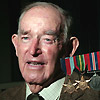Eric Sumner can't understand all the fuss that's being made about his trip to Gallipoli for Anzac Day 2007. He had wanted to go since he was 14, so when the opportunity came up, shortly before his 91st birthday, he jumped at the chance. Why wouldn't you?
Eric was diagnosed with Macular Degeneration in 1996. He says he was surprised because his eldest son became legally blind at 19 as the result of an industrial accident, so Eric thought he'd already had enough experience of vision impairment. He first knew he had a problem when he realised he was not seeing other cars when he was driving, and took himself straight to the local doctor.
At that time, he had retired to Phillip Island. He had built himself a house and had discovered a talent and love for watercolour painting, which had given him a second career as an artist.
Macular degeneration causes an increasing loss of central vision and an increasing loss of detail in vision. This has gradually meant many changes in Eric's life but, as he says, he wasn't one just to "sit on his tail".
Out of curiosity, Eric enrolled in computer classes at Vision Australia, to "find out what makes them go". At close to 90, he was one of the more mature students, but persevered.
Eric has learnt to touch-type and uses the computer with the help of screen-readers (talking software). He is now using his skills to record his memories of a long and sometimes adventurous life. As Margaret, one of our Assistive Technology Trainers explains "we're all impressed with what a persistent student he is!"
Eric's advice to anyone diagnosed with a vision impairment? "It's frustrating, but you've just got to get on with it."
Eric was born in Melbourne during the World War I, grew up during the Great Depression and was just 23 at the beginning of the World War II. One of four children, he says his father taught them to use tools and his mother taught them to cook.
At 14 he was apprenticed to a photo engraver who was also a Gallipoli veteran. For six years he not only taught Eric his trade, he filled his head with stories of Gallipoli and that's when Eric decided he would visit Gallipoli if he ever got the chance.
Eric married at the beginning of World War II. He volunteered for the RAAF Marine Section, using the sailing skills he had learnt sailing in Port Phillip Bay and Bass Strait. He spent the two years of the New Guinea campaign attached to a Catalina flying boat squadron in Madang, traveling up and down the north coast of New Guinea carrying supplies to troops in the jungle and carrying out the wounded. There were Japanese submarines under water and Japanese planes overhead and he was often at sea in a small boat with only one or two other men, many miles from base. His eldest son was five months old when he left, and a three year old when he returned.
Eric returned to Australia with malaria and had to readjust to civilian life. He says that many servicemen found that the civilian population often did not understand what they had lived through, and he is pleased and surprised at the ever-growing interest in their experiences that exists now.
Being able to return to the same job, Eric went on to become a lithographer and worked for the same company for the rest of his working life. He was blessed with a happy marriage and two more children.
Then five years later, tragedy struck. His beloved wife Brenda became suddenly ill, and was diagnosed with a brain tumour. She went through emergency surgery but never fully recovered. Eric cared for her until her death 10 years later, while raising three children and working full time. There were few services to assist families at that time and he is grateful for the help he received from family and from his employer.
Eric now lives in an RSL hostel. He retains enough vision to be able to get about with a scooter if he is out for the day. He still has an active social life. He marches every year on Anzac Day, regularly attends an RSL social club, exercises and keeps up with his ever-growing family. He now has 6 grandchildren and 10 great-grandchildren, but says it is getting harder to keep count!
Eric traveled to Gallipoli and walked every inch of the battle field with his walking stick. He was amazed at the kind support he received from the people on the tour, and at the attention his trip has drawn.
On the Monday after Anzac Day, Eric was back in computer class at Vision Australia!











